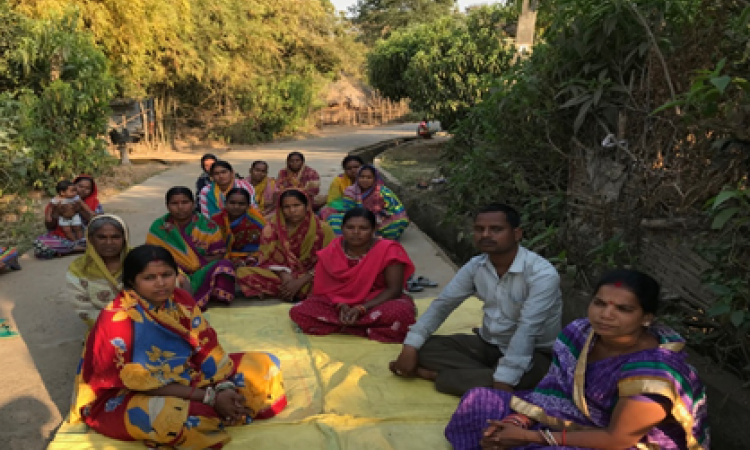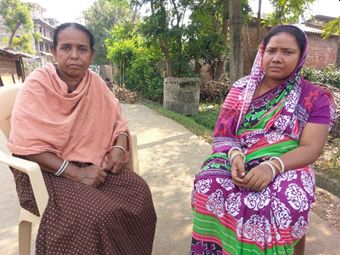
Sita Behera, the 35-year-old mother of two lives in the Radhamadhavapura unauthorised slum in Angul. She is the President of the Ward Sanitation Committee (WSC) that is leading the work on making the slum open defecation free. Driven by the desire to improve the living conditions for her children and the neighbourhood at large, she prompted 140 families to construct latrines over two years.
It helped that Sita has a tailor shop and is a member of a self-help group that works on microcredit, formed under the municipality’s urban livelihoods mission. She is well-known, vocal and willing to take up local social and environmental issues. When Project Nirmal’s team approached her in 2016 to lead a local committee to improve sanitation, she jumped at the chance to create a change.
“My slum was dirty, lacking toilets, and people defecated anywhere they could. The councillor suggested my name for the WSC and I helped set up the Slum Sanitation Committee (SSC). I realised the power of collective bargaining and took up several issues of the slum, guided by the project team,” says Sita.
She learnt which official to speak to for each civic amenity – street lights, water storage tanks and sweepers to clean the streets and drains. “The team helped with filling applications for each amenity to build trust and social capital with people in the slum. Soon, we were in a position to start propagating the need to make and use toilets. We plan to ask the municipality for a community toilet next to the community centre,” says Sita. There are nine people, including seven women, in the SSC.
Bhagyawati Pradhan, a 40-year-old joined in 2016. The SSC, she says, has not seen any changes in composition or leadership even once, so the original members still hold office. “If something is working well, why to change it?” she reasons. To her credit is the task of keeping Radhamadhavapura clean. Bhagyawati got the municipality to install dustbins and ensure sweepers clean drains as well as collect garbage every week. Earlier, they never visited the slum.
 In Ward 16 lies the Saubhagyanagar Hadichari slum with 150 families. Like in Radhamadhavapura, its SSC can claim credit for securing civic amenities such as better drains, power connections and the main slum road that is cemented. SSC president Chumuki Gochajat was selected in 2016 and over the past two years, has built a good rapport with the councillor of the ward and officials of the Angul Municipality.
In Ward 16 lies the Saubhagyanagar Hadichari slum with 150 families. Like in Radhamadhavapura, its SSC can claim credit for securing civic amenities such as better drains, power connections and the main slum road that is cemented. SSC president Chumuki Gochajat was selected in 2016 and over the past two years, has built a good rapport with the councillor of the ward and officials of the Angul Municipality.
She started small, organising meetings on sanitation for the Project Nirmal team to address. Soon she realised the slum had other priorities such as roads, power and water; sanitation was very low down in the list. “I advised the project team that to build trust and acceptance with slum people, we should demonstrate their ability to get things done by securing power connections,” says Chumuki Gochajat.
With them and SSC members, she approached the Angul Municipality’s Executive Officer who eventually gave his approval. They followed through by meeting the electricity department’s officials. Over the months, the SSC obtained power connections. This was a big morale booster and gave them the ‘legitimacy’ to bring sanitation onto their agenda. Then, they started a concerted campaign to make people apply for toilets, as well as to build and use them.
Chumuki says, “None of the households had toilets in 2016 and everybody used the pond behind the slum for defecating. It was a drawn-out process because people work as daily wage earners, domestic servants and street food vendors and could not afford to pay for making toilets upfront. They had a convenient open place to defecate. We have managed to get all of the eligible families to submit applications, though only 16 have completed their toilets.”
The SSC addressed the lack of money by loans from the four self-help groups in the slum, set up under NULM. She proudly declares, “the councillor only visits at election time so we have managed to improve our conditions through our efforts.”
Woman power
Women constitute a sizeable percentage of the multi-layered sanitation institutions in Angul set up under Project Nirmal to improve the sanitation chain, from construction and use of toilets to the treatment and safe disposal of excreta and move towards a systems-driven approach. The City Sanitation Task Force (CSTF), Ward Sanitation Committees (WSCs) and Slum Sanitation Committees (SSC) are the three tiers of institutions to generate public awareness about sanitation, monitor progress and status of sanitation, validate baseline data, approve the city sanitation plan, oversee and approve materials and progress reports by the implementing agency and guide the Municipality on sanitation-related matters.
All these women have a few things in common. They are excellent orators. They have a strong desire to make a change in their communities. They are knowledgeable about WASH, health and civic amenities. They are assertive and confident, gained from the years of support from Project Nirmal.
When asked about the role of these committees, Amulya provides an interesting theory of change. People in slums have special needs that SSCs take up such as roads and power. People in regular colonies take these services for granted. Once a slum gets these services they look like regular colonies and social distinctions start to blur. Economic distinctions remain even if the slum gets civic amenities, land tenure and houses under PMAY. However, the blurring of lines between slum and non-slum areas makes it easier to demand incremental improvements at the ward level through WSCs.
Their next big agenda for change is to secure land rights under the Odisha Land Rights to Slum Dwellers Ordinance, 2017. Urban poor households in municipalities and notified area councils (NACs) are eligible for property rights under the Odisha Municipal Corporation (Amendment) Ordinance, 2017. The paperwork has been completed but the process of transferring the land titles has not started yet. “This will be a big incentive for the laggards to make toilets. In my slum, the land belongs to the irrigation department. Once land titles are given to people, it will encourage people to make toilets,” says Sita Behera.
Improvements and challenges ahead
The slums are much improved from what they were in 2016, says Atal Behari Debata, the municipality’s nodal officer for the Swacch Bharat Mission. In the two years of its operations, Project Nirmal has organised SSCs in each slum with a majority of women, and WSCs in the wards with similar composition. This has helped to leverage SHGs in the slums that the municipality has set up while empowering women to take charge of improving living conditions in the slums. SSC and WSC members have been oriented on community mobilisation, negotiating with officials, technical aspects of making toilets and hygiene by the Project Nirmal team. The councillor monitors how the ward, including slums, is performing on sanitation and cleanliness.
There are more challenges ahead, says Sita. Now people have toilets with a single pit or septic tank, which will need regular cleaning. There is one private desludging vehicle in Angul whose owner charges Rs. 2200-2500 per trip depending on the distance and size of the pit or septic tank. This is too expensive. “The municipality has to bring the charges down for us to afford their services,” she says.
The women are confident that they can mobilise their fellow slum dwellers to demand pit emptying if the cost is right. After a few months of using toilets, says Janaki, they will not want to defecate in the open. Further, spaces for open defecation have shrunk or disappeared. The Project Nirmal team is aware of the danger of slippages in toilet usage. It is critical, says Narusingha, the city coordinator for the project, to keep SSCs and WSCs alive and engaged with local issues that include sanitation. This will ensure Angul remains open defecation free as envisaged by the project.
The overall vision of Project Nirmal was the demonstration of appropriate, low-cost, decentralized, inclusive and sustainable sanitation service delivery solutions for two small towns (Angul and Dhenkanal) in Odisha leading to improved sanitation access for all households and integration of FSM in the sanitation value chain, through enabling institutional and financial arrangements and increased private sector participation.
The project was completed in 2020 and was implemented by Centre for Policy Research and Practical Action with support from Bill and Melinda Gates Foundation; Arghyam; Housing and Urban Development, Government of Odisha; and Municipalities of Angul and Dhenkanal.
The case by Nitya Jacob is a part of the series demonstrating learning and outcomes of the Project Nirmal based on Scaling City Institution for India (SCI-FI)’s research on water and sanitation. More on the series: https://twitter.com/CPR_SCIFI